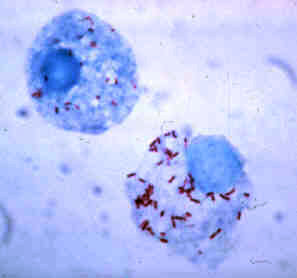intracellular bacteria on:
[Wikipedia]
[Google]
[Amazon]
 Intracellular bacteria are
Intracellular bacteria are
 Intracellular bacteria are
Intracellular bacteria are bacteria
Bacteria (; singular: bacterium) are ubiquitous, mostly free-living organisms often consisting of one Cell (biology), biological cell. They constitute a large domain (biology), domain of prokaryotic microorganisms. Typically a few micrometr ...
, which have the capability to enter and survive within the cells of the host organism. Many of them are capable of growth extracellularly, but some of them can grow and reproduce only intracellularly (obligate intracellular parasites). Besides bacteria, there are other kinds of intracellular microorganisms.
Examples of non-obligate intracellular bacteria include members of the genera ''Brucella
''Brucella'' is a genus of Gram-negative bacteria, named after David Bruce (1855–1931). They are small (0.5 to 0.7 by 0.6 to 1.5 µm), non encapsulated, non motile, facultatively intracellular coccobacilli.
''Brucella'' spp. are the caus ...
'', ''Legionella
''Legionella'' is a genus of pathogenic gram-negative bacteria that includes the species '' L. pneumophila'', causing legionellosis (all illnesses caused by ''Legionella'') including a pneumonia-type illness called Legionnaires' disease and a mil ...
'', ''Listeria
''Listeria'' is a genus of bacteria that acts as an intracellular parasite in mammals. Until 1992, 17 species were known, each containing two subspecies. By 2020, 21 species had been identified. The genus is named in honour of the British pio ...
'', and '' Mycobacterium''. Examples of obligate intracellular bacteria include members of the order Rickettsiales
The Rickettsiales, informally called rickettsias, are an order of small Alphaproteobacteria. They are obligate intracellular parasites, and some are notable pathogens, including ''Rickettsia'', which causes a variety of diseases in humans, and ' ...
and members of the genus '' Mycoplasma''.
See also
*Endosymbiont
An ''endosymbiont'' or ''endobiont'' is any organism that lives within the body or cells of another organism most often, though not always, in a mutualistic relationship.
(The term endosymbiosis is from the Greek: ἔνδον ''endon'' "within ...
References
Bacteria Microbiology Cells {{Bacteria-stub